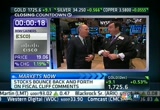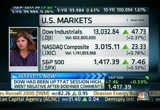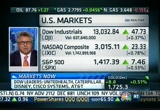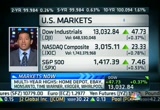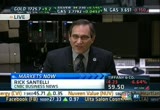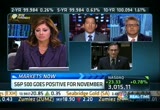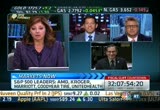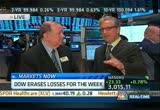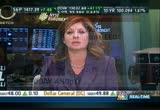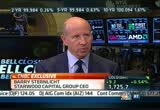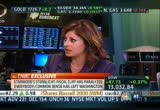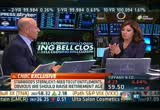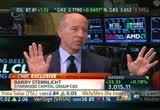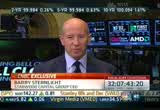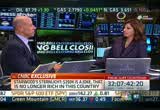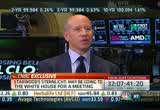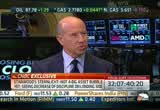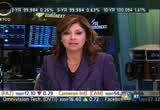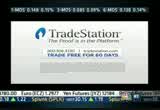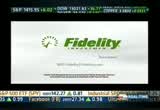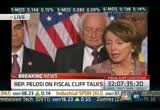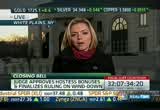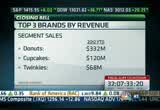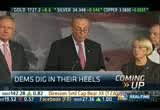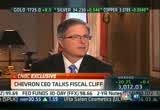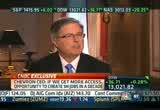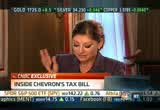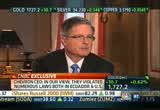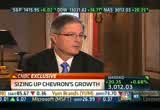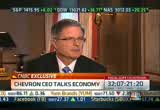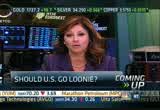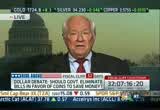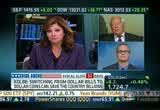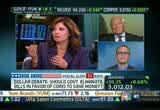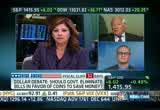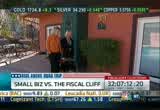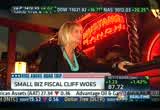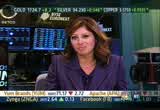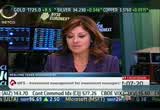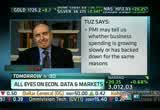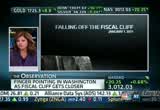tv Closing Bell With Maria Bartiromo CNBC November 29, 2012 4:00pm-5:00pm EST
4:00 pm
nancy pelosi. >> it would be nice if they continue to do that. otherwise, we could trade our way out of this deficit. >> we've talked about that before. thanks very much. that is the first hour of "the closing bell." stay tuned. up next, a couple ceos with their take on where we go from here. the second hour with maria. i'll see you tomorrow. and it is 4:00 on wall street. do you know where your money is? hi, everybody. welcome back to "the closing bell." i'm maria bartiromo on the floor of the new york stock exchange. the market on a roller coaster ride today. a slight gain on the session, even though the market closed off the best levels of the afternoon. it had been up about 77 at its best. nasdaq composite picked up 23 points. the s&p 500 tonight up 7 1/2,
4:01 pm
half a percent. the market continues to watch the fiscal cliff. trading action has resolvolved around this. ben, what is your fiscal cliff strategy? what do you want to do with your money in the economy does go off the fiscal cliff? >> yeah, we were worried about that back in september, october. so even though we like the equity markets going into 2013, we wanted to hedge ourselves a little bit, so we took money out of equities. didn't just put it into cash. we put it into three areas we think are still good long term. one is we talk about emerging market equities, but i like
4:02 pm
emerging market debt. these monetary authorities are done tightening. they fought the inflationary problem that they had successfully. they're in hoed. yield curves could shift down. we stress doing it in local currency. the other areas are u.s. high yield, which i still think is valuable. we do think spreads will contract and emerging market equities as well. >> jordan, what about you? how are you preparing for what could be an eventuality where we go over the cliff and we've got to deal with higher taxes and a slower economy? a lot of people expecting recession in 2013, if, in fact, this occurs. >> think about what works well in a slow-growth economy. consumer products companies do well. high dividend payers. you'll see 100 companies that have already declared dividends this month. those are the strongest companies in the market. those are the ones that can afford to buy back shares or invest in high r.o.e. projects next year. i wouldn't avoid them just
4:03 pm
thinking dividend taxes are going up. they're the strongest in the market. you also have energy infrastructure, which is paying about 6%. most of it is a return of principle. these are companies with some of the lowest cost of capital ever. high return projects, long-term contracts. the government is in support of energy independence in this country, so we don't think the taxes change for mlps and energy infrastructure investments. finally, if you like high-yield corporate bonds, we love high-yield municipal bonds where we're getting 6% federally tax free. corporate high yield has rallied too much. we've sold it. >> rick santelli, should we be focusing on something else? this constant focus on the fiscal cliff, obviously, it's been dictating sentiment. it's been dictating markets. are there other areas that investors should be looking at? >> well, i had a guest this morning, dr. saunders, who's testified on issues regarding
4:04 pm
housing, fha, in front of congress. he knows what he's talking about. he brought up what many of us are looking at. a lot of -- you know, real estate, residential construction was one of the positives in today's gdp report. we've seen a lot of positives in housing. but there's been a lot of legal ranging over a big group of foreclosures that looks like it's cleaned itself up. 2013 could see a lot of these dumped in the marketplace. i think housing is an area that we've seen progress, but it still might have a sluggish 2013. i really agree with our guest on high-yield munis. remember, there has been talk that one of the reforms, one of the loopholes they may close is some of the tax treatment of munis. i personally don't think it will happen, but it is an issue to be on top of. >> all right. let me ask you guys the same question, jordan and ben. are there other issues you think will drive the markets away from the fiscal cliff, or is this the appropriate issue to focus on in terms of the impact on markets and money? >> well, everyone who's been in
4:05 pm
the private wealth space or the investment space like we have has had to learn about default rates in greece and the price of bonds in spain and italy. that continues to be an issue. clearly, what's happening in europe is going to be a head wind for investors. but what's going on in this country from the fiscal cliff perspective, that's really what's driving sentiment on an hour-to-hour basis and really what's driving things to the end of the year. >> sure is. ben, you agree with that? that's appropriate? >> jordan sort of beat me to europe. but i think another issue is look what's happening to the chinese stock market going down as much as it has. it's causing a little bit of skiddishness around what's an important sector of the market, emerging market equities. watching that, i think, will be important to make sure the landing in china economically is indeed soft. >> all right. we'll leave it at that. of course, that has a lot of implications for the world, given the chinese economy has been the engine of growth for
4:06 pm
the entire globe. thanks, gentlemen. see you soon. we appreciate it. let's find out what moves the traders are making ahead of the fiscal cliff. bob now with ubs's art cash. over to you, bob. >> hello, maria. art, even though we're being smacked around by the usual l fiscal cliff headlines, the market still advanced today. actually, fairly broad. almost three to one. >> well, the market is looking at the calendar. it wants to hear sleigh bells. it wants to believe a santa claus rally is lurking there. the other thing it finds comfort in is it believes that as fractious as things can be, that the leaders in washington have learned their lesson. that the wrong word can move markets and they will be somewhat careful, that nobody will produce anything like the 500-point selloff in the t.a.r.p. vote. they think there's a minor protection there. nevertheless, we're in an age of auditory lottery tickets. whoever gets to the microphone
4:07 pm
swings things. >> yet, they believe that, number one, it's coming soon, that something is going to happen in december, and it's going to be a credible plan, something that's a real down payment that won't trigger some kind of ratings downgrade by the agencies. >> well, i think, again, they believe that these guys are chastened enough not to go off the deep end, and for all the talk, it might be go to go over the cliff for a little bit that people really think nobody wants to take that gamble. you don't want your political party becoming a footnote. >> materials, financials, health care all advanced today. a fairly broad advance, even if it was only fractional. back to you. >> all right, bob. thank you so much. we'll see you later. let's get a check on the winners and losers. jackie deangelis has that story. >> the markets closing higher despite turning negative earlier in the session. the dow logging a 47-point gain.
4:08 pm
today's leaders include kroger after stronger than expected third quarter profits. goodyear tire rising as well. amd putting its austin campus up for sale. big volume in that name. today's laggards include many of those retail names. kohl's, macy's, and gap. we saw tiffany lower after disappointing earnings. >> all right, jack. thank you so much. fiscal cliff negotiations spinning the markets up and down like a yo-yo. i'll get reaction next from real estate guru barry sternlicht. also, we'll discuss how he's putting his investment firm to work. wait until you hear what he has his sights set on. and stick around for my exclusive interview with the chevron ceo.
4:09 pm
we'll talk about whether dividends are in the pipeline or a big acquisition on the horizon. and is it time to kill the $1 billion? the case is being made today on why $1 coins make more sense. do they really? stick around for that heated debate comes up. you're watching "closing bell" on cnbc. we're back in a minute. at u.s. trust, our expertise extends well beyond investment advice and research analysis. it includes proprietary offerings like our eldercare program, which helps provide for those who came before you. and our financial empowerment program, which helps prepare those who come next. resources like these have made us the number-one trust company. that's why generations of families have come to us to help build their own legacies. [ male announcer ] the way it moves. the way it cleans. everything about the oral-b power brush is simply revolutionary. oral-b power brushes oscillate, rotate and even pulsate
4:10 pm
4:12 pm
welcome back. starwood capital group has over $21 billion in assets under management. with the fiscal cliff hanging in the balance, how is the ceo putting that money to work? he joins me in a cnbc exclusive right now to talk about that and more happening in real estate and housing. nice to have you on the program. >> nice to be here. >> what are you hearing out there? what's your take first on the fiscal cliff? what are you seeing in terms of customers? how is it influencing your decisions? >> i'd say it's paralyzed everybody. you're hearing this from everybody. we all are sort of watching this dance in washington and not understanding, like -- i think it's common sense has left washington. you have to come up with spending cuts. i think those of us that will be targeted in a tax hike, which i don't consider a tax hike, really. i think the payroll tax cut, which didn't really work, it didn't boost the economy. also, the rising capital in
4:13 pm
income tax rates is acceptable, but only if the democrats get serious about cutting spending. >> so far, we haven't seen any real ideas in terms of -- >> it's a joke. it's a joke. you get more revenue from raising taxes, but you haven't cut spending. you're just putting off another disaster. it's so obvious you should raise the retirement age in the united states. there are easy, noncontroversial things. >> we're living until 100 now. we still vice president chanhad retirement age. >> i think $250,000 is a joke. if you have three kids in college, you're lost at $250,000. you can't afford to pay for your house and your kids' college. that's no longer rich in the united states. >> look, let's be honest. the average income, i guess, is $40,000. you know, you want to put it into perspective.
4:14 pm
$250,000, when you've got three kids in school and you've got gas -- >> and you live in new york. >> new york or california. you're living paycheck to paycheck. >> i think it's funny. it is the middle class that is getting squeezed here. there's a point where you're sending your kids to college and you don't qualify for financial aid. anyone making $40,000, they're covered. >> they're not paying income tax. >> the problem is, i think the whole -- what's lost on, at least to me, to the current administration, is you must get these people jobs. all of our resources, all of my tax increases should go to partnership mentoring, job training because the government gets 30%, 20% of every dollar i earn the rest of my life. you want me to get an education so off tie on my income for the rest of my life on earth. >> then there's the $16 trillion question. >> then the revenues. there's a lot of questions.
4:15 pm
>> here you are having been in this business for as long as you have. you're talking to people in real estate all the time. what are you seeing in terms of what they're doing now? does it make sense if you're sitting on something that you want to sell, you want to sell a home, a building, stocks, should you do it by year end given your cap gains tax is about to go higher? >> yes. if you have a long-term gain, you should definitely take it. in january, you'll be able to buy it back. the rules don't apply to gains. you can buy back the stocks take the gain right now and put it in your pocket and buy the stock back a day later if you want. it's likely that -- and i would think that our base case is cap gains go from 15 to 25 and add the 3.8% health care tax. i don't think the market will go up 14%. i do wonder where this tax selling is going to come in. have people done it? you saw the selloff after the election. i don't know what that was exactly. maybe that was the fact they knew we were going to hit a
4:16 pm
fiscal cliff discussion and people said, i'm out. i did selling myself after the election. in real estate, it's a longer term asset. as you're seeing in our property markets, it's what bernanke wanted. you're seeing an inflation in asset prices. but it is difficult to invest because you feel like this interest rate climate is being subsidized so artificially you'll get trapped. so you worry about a spike in rates because maybe bernanke retires, the policy changes, the economy does take off, asset prices begin to bubble up too high. i'd say it's not a big asset bubble yet, but you are seeing increasingly less discipline on the lending side. there's so much hunt for yield. the typical buyer of bonds and debt isn't doing the due diligence of an equity guy. they're buying bonds manufactured off the street. >> is that going to change in 2013? you were a romney supporter. do you have to change your strategy now that we know we have president obama for the next four years? he's got a much different
4:17 pm
mentality. >> i'm a social liberal fiscal conservative. my party doesn't really exist. i thought if the nation got burr rid under trillions of debt, there would be nothing to talk about. we wouldn't have a social agenda. >> we're close to it. >> 16 on our way to 20. then you lose options. you go over an edge where you're only services debt. today our interest expense is like $120 billion or so. 4% on $20 is $500 billion. that overwhelms all the discretionary spending. somebody has to get serious in washington. i'm hoping obama is coming to be a great president, which has come to the center. he inherited a bad economy. there's no doubt, right? but we haven't made a lot of progress. we haven't given business a lot of confidence. we have $1 trillion -- >> antagonistic with business. >> we would call it antagonistic. a lot of listening but not a lot of hearing. i'm supposed to go -- i won't
4:18 pm
say that. >> you're going to go to the white house. >> maybe. >> why would you go to the white house? you think he's listening? all these photo ops with all these ceos. >> do i have to answer this? >> what are they doing? why go? >> because he's the president of the united states. it is the white house. in the case, you can make an impact, you should do it. >> but that's the question. can you make an impact? >> at the moment, it looks like not. again, i said this recently at another conference. if you're a ceo, you're going to get your constituents in a room and not leave. you're not going to get in a plane, bring people in to antagonize the other side as rerecently did. you're going to sit in a room until you hammer this out. >> is it better to allocate money outside the united states? let me ask how you're allocating capital. there are some reports you're going to be buying a hotel chain from india's biggest real estate company. is that right? >> we're buying a hotel chain here in the united states from pimco. >> l & r property. >> that's different.
4:19 pm
that's from five different owners. >> what are you buying? >> the spread between yields on property and interest rates today, given how aggressive lenders are at the moment is the widest maybe in my lifetime. you can earn very attractive interest rate -- or cash on cash returns in property in the united states right now. it's probably safest, i think, around the world, the u.s. is the safest place to invest still. europe is -- we're active there. we have some stuff under contract. europe's growth is a lotless likely than the united states is going for. we have this rabid consumer. he's a little off today. his home equity is going up. he's spending money. in europe, europe hasn't fixed itself. there could be significant demand destruction like office demand, rents could drop. shoppers will panic if the the euro falls apart. so we're being very careful in europe. brazil is interesting. >> going down quite a bit, right? >> a lot.
4:20 pm
but it's also a lot of money out of the markets. we find it interesting. we have a very large partner in brazil. he's aggressively buying because there's better deals to be done. people thought capital would be infinite. prices have fallen, and people have too much debt. so they're willing to sell. >> final question here. if we go over the fiscal cliff, you're at a great spot to tell us what you would see in the economy. how tough would things be? how tough would it be for real estate and your business? >> i don't mind. >> if we go over the fiscal cliff? >> no. >> why? >> because i think it will teach everyone a lesson. >> unemployment goes up. >> look, i think -- it isn't actually the impact of that. i think it'll get people so angry with the administration and the republican party that i think you might see something happen, actually. maybe that's what it takes, a good crisis is a terrible thing to waste. >> we've heard that before. barry, great to see you as always. >> pleasure. >> thank you so much. chairman and ceo of starwood
4:21 pm
capital group. we're still waiting on house minority leader nancy ppelosi. we'll bring you that when it happens. meanwhile, corporate america preparing for a worst case scenario. the chairman and ceo of chevron will join me. keep it here on "the closing bell." the interview you won't hear anywhere else today. up next, is anyone bucking up to save the twinkie? kayla is next with the update on hostess suitors on the other side of the this break. back in a moment.
4:22 pm
or that printing in color had to cost a fortune. nobody said an all-in-one had to be bulky. or that you had to print from your desk. at least, nobody said it to us. introducing the business smart inkjet all-in-one series from brother. easy to use. it's the ultimate combination of speed, small size, and low-cost printing.
4:23 pm
looking for a better place to put your cash? here's one you may not have thought of -- fidelity. now you don't have to go to a bank to get the things you want from a bank, like no-fee atms, all over the world. free checkwriting and mobile deposits. now depositing a check is as easy as taking a picture. free online bill payments. a highly acclaimed credit card with 2% cash back into your fidelity account. open a fidelity cash management account today and discover another reason serious investors are choosing fidelity.
4:24 pm
i'm holding firm to the 250 -- >> house minority leader nancy pelosi right out of her meeting with tim geithner. let's listen in. >> that would be part of a big, bold, and balanced package that has big cuts. we've already voted for over $1 trillion in cuts. revenues are needed. job creation is essential to reducing the deficit. we firmly believe if you want to reduce the deficit, create jobs. you can grow the economy and reduce the deficit. it's all together. and that is attested to by every bipartisan task force, commission, you name it, that has come together. you can't get there from here in terms of deficit reduction and fiscal soundness without having revenues be on the table.
4:25 pm
i'd like to yield to the assistant leader for his comments. >> thank you, madame leader. i think that this meeting was very, very fruitful. it simply reminds us -- >> we are listening to commentary after nancy pelosi's meeting with timothy geithner. as you heard, ms. pelosi continuing to stick to her guns in terms of raising revenue as well as spending cuts. we don't have the clarity this market is looking for. that is, where will the cuts be? where will the revenue be? we're still waiting on compromise. as soon as we get some indication of that compromise, we'll bring it to you. maybe there's hope, meanwhile, for the twinkie. hostess says it's talking with more than 100 interested parties looking to acquire their brands. kayla is here with the latest. over to you. >> reporter: thanks, maria. from the fiscal cliff to the twinkies, it's the latest here for the hostess bankruptcy saga.
4:26 pm
a judge at southern district bankruptcy court here in white plains approved a $1.8 million payout to 19 of hostess' executives. that's excludeing the chairman and ceo greg raybourn. that will be an incentive payout to have the executives have the appropriate motivation to wind down the business. there are certain benchmarks and cost cutting and sale mechanisms this place. that's important because now the focus shifts to selling the 30 businesses left. of course, many of hostess' brands are extremely iconic. we all know the twinkie. we all know the ding dong. we heard today from the hostess lead banker running that sale. he said there are 110 interested buyers that are potentially going to bid. 70 of those buyers have signed nondisclosure agreements. he expects about 50% of those bids to actually materialize into real interest come december 10th. everyone is talking about saving the twinkie. when you look at the breakdown of the brand's revenues, it's the donuts that make the most money. they make almost three times as
4:27 pm
as much in sales as the twinkies. actually, the cup cakes make more than twinkies. no doubt a lot of these brands are getting a lot of interest from potential buyers. we'll certainly have to see what happens. it looks like january is when court ordained initial bids could come to the floor. we still have a lot to develop in this process, but certainly one we're watching closely. if you go online to our poll on cnbc.com, vote for your favorite hostess brand. 44%, the last time i checked, had voted for the twinkie. >> all right, kayla. thank you. meanwhile, crude oil prices losing 10% of the value this year. does the head of one of the world's largest oil companies, chevron, think prices will bounce back above $100 a barrel any time soon? my exclusive interview is coming up next. he also has interesting things to say about the impact of the fiscal cliff is uncertainty. also ahead -- >> i don't understand his brain, so you should ask him.
4:28 pm
>> senate majority leader harry reid digging in his heels, referring to house speaker john boehner when asked about the republican's position that the ball is in the democrat's court. he said he doesn't understand his brain. we'll hear what reid's nevada constituents think about the job he's doing. also, could our debt mean the death of the dollar bill? i don't mean the value of the dollar. i mean the actual dollar bill. it may be on the endangered species list. stay with us. back in a moment. but whether he's climbing everest, scuba diving the great barrier reef with sharks, or jumping into the market, he goes with people he trusts, which is why he trades with a company that doesn't nickel and dime him with hidden fees. so he can worry about other things, like what the market is doing and being ready, no matter what happens, which isn't rocket science. it's just common sense, from td ameritrade.
4:31 pm
welcome back. chevron ceo john watson telling me exclusively today that the second largest u.s. energy company is moving forward on investments despite fiscal cliff concerns. we begin on our conversation, zeroing in on lawmakers' efforts in washington and whether he thinks they can work out a deal. >> i hope we can. there's greatty in the business community waiting for something to be done. there are big concerns about structural deficits going forward. there are concerns about tax increases that would be coming
4:32 pm
absent some sort of a deal on the fiscal cliff. >> the fiscal cliff has been the issue that has stopped or sort of made companies reluctant to push cash to work, to hire folks. is that stopping you, or are you moving forward regardless? >> actually, we've been moving forward with our investments. we're spending some $32 billion this year on energy projects around the world. i expect we'll spend even manufacture thmore than that next year. all we need is the opportunity to invest. we need to have access. we need permits, and we need a tax structure that supports what we do. there will be a tremendous opportunity to create jobs and government revenue if we're given that opportunity. >> let's talk about that. the access to the product all around the world has got p tougher, hasn't it? >> it has. i'm encouraged by the sale we had this weekend. i would encourage the administration to do condition sales. right now, most of our continental shelf is off limits. we need to address that. if we do that, there's an
4:33 pm
opportunity across public and private lands to create 1 million jobs a decade in this country. there's opportunity to literally create trillions of dollars in tax revenue and make us more energy self-sufficient. i think all those are good for the american people and the fiscal problems we have. >> the multinational companies oftentimes are seen by the public as these companies that spend jobs overseas. talk to us about that. what can you do to prove to the american people that, in fact, you are creating jobs in america, but you have to actually create jobs in places you're operating outside the u.s.? isn't that true? >> we do. i think the benefit is to multinationals in three areas. one is the wealth we create for americans. our to be is held by americans. chevron, for example, has created $170 billion in wealth through our stock price and dividends over the last decade. we also produce energy. every drop of oil we produce overseas keeps oil prices down in this country. >> yet, the oil companies as an industry constantly get bashed
4:34 pm
over taxes, over the profits that we see. in fact, in 2011, chevron was one of three oil companies that paid more in income taxes than any other corporation in america, which i find amazing. $17 billion in taxes. >> well, our income taxes in 2011 were about 43%. it's been in the same range over the last few years. we do pay our fair share. we pay taxes overseas. we pay taxes here. we pay other forms of tax as well. i think that story hasn't been told. the fiscal terms that are in place here for our industry, for example, if punitive taxes were imposed on our industry, would impact our investment. i hope that's not where we're headed. i think there is a case to be made that we pay our fair share of taxes, and i work hard to try to communicate that. >> talk to us about an energy policy. what would you like to see in the election is behind us. what should a proper energy policy look like to do everything you're saying, create
4:35 pm
jobs and, in fact, take advantage of this opportunity that america has. >> i think the energy policy sometimes is made more difficult than it needs to be. to me, there are three things th that you need focus on. do you want affordable energy, do you want secure energy, and the environmental characteristics you want. we talk about those one at a time. we need to talk about those together. >> let me ask you a few questions about from the investment community. i guess the biggest cloud hanging over the company is this $28 billion judgment by the court in ecuador. what can you tell us about that? what should investors know at this point in time in. >> well, the simple answer, this has been labeled an environmental case, but it's really not. it's actually a fraud that's been perpetrated on hair sholders of our company. we're going to fight it vigorously. basically, what we've seen is u.s. trial lawyers have gone to a foreign government, and they have bribed judges, they have blackmailed judges, they have ghost written expert opinions, they've ghost written court judgments. in our view, they've violated
4:36 pm
numerous laws, both in ecuador and the united states. all of it is available on videotape depositions and in e-mails because the crime fraud exception has been invoked by numerous judges in the united states. our strategy is to fight it, fight it hard. we feel we'll prevail in the end. >> i know this is a significant case, however, this is also sort of the normal for the industry, isn't it? this is the uphill battle you're fighting all the time, this hostility. >> rule of law, i would say, is the biggest risk not just to our industry but business in general. the world is becoming much more international and interconnected. it's very important that we have laws and norms that are functioning. so companies like ours and others can have a predictable and successful business overseas. this case is a little bit different in that it's a fraud. >> what kind of growth are you expecting in the next year at chevron? you've been outperforming your peers for many years now. what can investors expect? >> we have a good story to tell. with the investments that we're putting in place, we've talked
4:37 pm
about growing our oil and gas production some 20% between now and 2017. so that is in place. those plans are being prosecuted today with all the projects we have under way. the most notable are two big natural gas developments in australia. >> so $22 billion in cash on the balance sheet. what are you planning on doing with that money? >> certainly in the near term, our plans are to continue to invest it wisely. we have a robust plan to return money to investors. we've increased the dividend double digit rates the last few years. we've been repurchasing $5 billion in shares per year. depending upon the economic conditions we see, oil prices, et cetera, i think there's room for both of those to be continued for many years to come. >> in terms of the dividend versus the share buy back program, what's a priority, and does the new law in terms of dividend taxes dictate your decision? let's say, hypothetically, that we go off the fiscal cliff and dividend taxes go to 44%.
4:38 pm
does that dictate how you pay dividends versus share buy backs? >> well, we've talked to our shareholders about that. so far, it isn't. whether that will change going forward, i don't know. so far, our shareholders seem to like the fact that we've increased the dividend 25 years in a row and that we're returning cash to them. we're doing it in a balanced way. we're doing it through dividends. we're also doing is through share purchases. we have plans to continue our strategy of increasing dividends as the pattern of earning and cash flow permit going forward. >> what's your expectation for oil prices in the year ahead? >> my predictions haven't been very good in the past, but i think we're in a period where i wouldn't be surprised to see a sideways market. we could see some ups and downs depending, of course, on events in the middle east and expectations around the condition of the economy. >> in terms of the economy, are you worried about 2013? a lot of talk about recession, particularly if we were to go off the fiscal cliff. what's your take on economic landscape in the next year?
4:39 pm
>> i think there are mixed signs out there. there is great apprehension in small business and in business at large with the prospects of tax increases or dramatic spending cuts that might trigger triggered. i think there's great anxiety. when there's anxiety, people generally don't spend money. the concern is well founded. >> and my thanks to john wattson. political posturing on the fiscal cliff from leading republicans and democrats alike. >> i remain hopeful that productive conversations can be had in the days ahead. but the white house has to get serious. >> we have made our proposal. let them come forward with something. >> find out what senate majority leader harry reid's nevada constituents are saying about his performance. also, is it time for the u.s. to join the ranks and put $1 billis to rest in favor of a $1 coin?
4:40 pm
believe it or not, people feel passionate about this issue. our heated debate is coming next. stay with us. system spoke a language all its own with unitedhealthcare, i got help that fit my life. information on my phone. connection to doctors who get where i'm from. and tools to estimate what my care may cost. so i never missed a beat. we're more than 78,000 people looking out for more than 70 million americans. that's health in numbers. unitedhealthcare. when you take a closer look... ...at the best schools in the world... ...you see they all have something very interesting in common. they have teachers... ...with a deeper knowledge of their subjects. as a result, their students achieve at a higher level. let's develop more stars in education. let's invest in our teachers... ...so they can inspire our students.
4:41 pm
let's solve this. heartburn symptoms causedelieve by acid reflux disease. osteoporosis-related bone fractures and low magnesium levels have been seen with nexium. possible side effects include headache, diarrhea, and abdominal pain. other serious stomach conditions may still exist. talk to your doctor about nexium. governor of getting it done. you know how to dance... with a deadline. and you...rent from national. because only national lets you choose any car in the aisle... and go. you can even take a full-size or above, and still pay the mid-size price. this is awesome. [ male announcer ] yes, it is, business pro. yes, it is. go national. go like a pro.
4:42 pm
i heard you guys can ship ground for less than the ups store. that's right. i've learned the only way to get a holiday deal is to camp out. you know we've been open all night. is this a trick to get my spot? [ male announcer ] break from the holiday stress. save on ground shipping at fedex office. welcome back. a fiscal cliff deal could kick dollar bills to the curb. today, a congressional panel listened to reasons for and against replacing dollar bills with dollar coins. a government report says that move could save taxpayers nearly $4.5 billion over 30 years. as we look for ways to save in the debt debate, those numbers could entice lawmakers. former arizona congressman
4:43 pm
supports the switch. on the other hand of the coin is bankrate.com senior analyst klaus bell who says the government can keep the change and should stick with the bills. congressman, good to have you on the program. thanks for joining us. the gao says the savings could be $4.4 billion, of course over a 30-year period. is the savings really significant enough to make a dent in the deficit and worth a change to coins? >> well, let's be honest when we're talking about the kinds of deficits we're at today. $4.5 billion isn't going to solve the deficit problem, but i don't think it's anything to sniff at either. there aren't a lot of programs where we're going to save money without having any tax increase or cutting anybody's program. this does that. so, yeah, it's a real savings. it's a real savings over a long period of time. i might add that the canadians found that their estimates of the savings were way
4:44 pm
underestimated. in the case of canada, it was like five or six times as much as they actually saved. >> klaus, what do you think? why do you think paper is preferred? >> well, when you look at the gao report, a lot of that savings is actually additional reven revenue. that's going to be more money coming out of the keconomy and going into the government. there's not really a lot of cost savings if you look at the actual numbers from the gao. >> wouldn't coins be easier, especially for smaller transactions? >> well, i think, really, the market has spoken there. npr last year found a billion of these things hitting on shelves in a warehouse somewhere. i think if there was a real benefit to retailers, if there was a benefit to consumers, they wouldn't be sitting there. they'd be in circulation. >> all right. congressman, what about that? dollar coins have been in circulation since the 1700s. modern day consumers have always gravitated toward the bills. if they had the choice, why force the change?
4:45 pm
>> you notice that you don't go into a store and have a choice between having a paper quarter and a coin quarter. you get the coin quarter. it's the same thing with the dollar bill. the experience in all the countries, every major country that's done this, that once you make the transition, and if you make the transition as rapidly as possible, it's very, very successful. the canadians have had tremendous success with their along, their $1 coin and the $2 coin. same in australia and elsewhere. i hate to use the phrase, but it's common sense to say these small transactions really should use coins. i'm always trying to save enough quarters to stuff into the parking meter to get a half an hour of parking there. if you had a dollar coin, it would be easier to do that. >> it's also a heavier load to carry. that's another issue to think about. >> maybe not. i might be carrying a $1 coin instead of four quarters.
4:46 pm
>> okay. klaus, we spoke to jack dorsey recently. he created square, pay for things on your mobile device. does this whole move to mobile payment almost make this whole debate moot? >> yeah, it's interesting. if you look at the gao report, it says that the transition from dollar bills to coins would actually cost many hundreds of millions of dollars initially. we're going to pay up front to make this transition. then electronic payments become even more popular and kind of make this whole issue moot. it seems like a lot of that money will have been wasted. in terms of the weight, that adds a lot of cost to retailers. 5,000 $1 coins weigh almost 90 pounds. if you're a walmart or costco and getting lots of cash in every day, that's an additional cost you have to pay. >> what do you think, congressman, the move to mobile? >> there's no question we're moving more towards mobile, which is one of the reasons we need to have a modern currency. i remember this debate when i was chairman of the
4:47 pm
appropriation subcommittee more than a dozen years ago. they said, you know, we're going to all start moving towards electronic. it hasn't happened. i think you're always going to be using currency, whether it's paper currency or coin currency. what we need is a currency that's modern and one that people are willing to use. i think they're more willing to use coins for these kinds of transactions. >> all right. we'll leave it there. gentlemen, thanks very much. we'll be watching this debate. we appreciate your time tonight. see you soon. rising above. just 32 days left for hour nation's lawmakers to reach a deal on the fiscal cliff. jane wells has been hitting the road to find out whether constituents think they're getting the job done. jane is just back from harry reid's hometown of nevada. >> yeah, and i've been carrying around this purse full of coins which weighs about 100 pounds. not a fan. maria, harry reid's state has been hit harder in the downturn than any other state in the nation. the recession has affected every industry there, even the wofrrls
4:48 pm
oldest. >> how's business? >> it's been better. >> susan austin runs a small business outside reno, nevada. but her business is different. it's a brothel. the legendary mustang ranch. >> this is one of our suites. this is the asian suite. >> austin thought the world's oldest profession would be recession proof. not true. >> a lot of my high rollers suddenly discovered they didn't have the discretionary income. they couldn't play as hard as they used to. well, that definitely dug into their wallets, which definitely affected us. >> lance gillman owns the brothel. will the fiscal cliff impact the mustang ranch? >> well, if folks run out of money and jobs, i suppose it could. >> gillman is a republican who is looking to nevada's powerful democrat, harry reid, to keep that from happening. >> do you like harry reid? >> harry reid and i have been friends for 30 years. harry and i both share a vision and a love for the state of nevada.
4:49 pm
>> susan austin says even here the cliff will hurt. >> anything that happens in washington affects everybody in the united states. it's going to trickle down to me sooner or later. it's definitely going to hurt me in the end. >> now, the ranch owner says political leaders need to realize money is on the sidelines until confidence returns. as for susan austin, you can see her entire interview on the blog funnybusiness.cnbc.com. back to you. >> thanks so much. we'll be watching that. jane wells. two more companies announcing special dividends tonight. here's a quick market flash. >> that's right. national beverage confirming its board has decided to distribute a special dividend of $2.55 a share. the record date will be december 7th. also, regal entertainment announcing $1 per share for its class "a" and "b" common stock. these two companies among many others declaring special dividends ahead of the end of the year as the threat of the fiscal cliff looms. all right. thanks so much.
4:50 pm
let's forget about the fiscal cliff for a moment. find out what will move your money first thing tomorrow morning. stay with us. we're back in a moment. oh...there you go. wooohooo....hahaahahaha! i'm gonna stand up to her! no you're not. i know. you know ronny folks who save hundreds of dollars switching to geico sure are happy. how happy are they jimmy? happier than a witch in a broom factory. get happy. get geico. fifteen minutes could save you fifteen percent or more.
4:53 pm
this has investors are digesting comments on the fiscal cliff. what does tomorrow hold? we have 30 seconds on the clock for each of our next guests. they'll tell us what they think will move your money tomorrow. good to see you, gentlemen. thanks so much for joining us. brian, we'll kick it off with you. 30 seconds on the clock. what do you want to look at tomorrow? >> on the economic front, we get personal income and spending. the chicago pmi. i don't expect that to move the market a whole lot. again, it continues to be all about the fiscal cliff. geithner, boehner, and reid and any little nugget of information we get there continues to whip saw the market. don't expect any changes tomorrow or really next week until we get more clarity on that situation. the up shot of that is companies continue to make these special dividends, borrowing cheap in the bond market in many cases and continue to pay these dividends before the end of the year. >> all right. we'll be watching that.
4:54 pm
darren, you're up. 30 seconds on the clock. >> i'm looking at the euro. looking for the pullback to the 129.50 level. i do think we're going to hold that level and push higher. that will push risk assets higher as well. i'm looking for a consolidation of the s&p overnight. once we get through chicago purchasing managers, i think we're going to reverse to the up side. we'll end the week on a strong note. again, it will be whippy with headline to headline. i don't think we're going to get many headlines into the weekend. >> all right. thanks so much. last but not least, peter, you're up. 30 seconds on the clock. what do you want to look at? >> thank you, maria. in real estate, it's location, location, location. in markets tomorrow, it's the cliff, the cliff, the cliff. it has created some volatility, which has given us opportunities to look for good growth stocks like church and dwight and motorola solutions to buck purchase recently. i hope to find more tomorrow.
4:55 pm
thank you. >> all right. we'll be watching that. thanks very much, gentlemen. it sounds like with all this fiscal cliff stuff, you guys are a little bit on the sidelines. is that a fair statement? real quick, yes or no. >> you pick your spots. >> i think a lot of big money is on the sidelines, but i think that it's a good opportunity to be in. >> thanks, you guys. see you soon. we appreciate it. with the fiscal cliff getting closer and closer every day, my thoughts on the lack of leadership in america. that's up next. stick around. what starts with adding a friend... ♪ ♪ ...could end with adding a close friend. ♪ the lexus december to remember sales event is on, offering some of our best values of the year. this is the pursuit of perfection. [ male announcer ] the way it moves. the way it cleans. everything about the oral-b power brush
4:56 pm
is simply revolutionary. oral-b power brushes oscillate, rotate and even pulsate to gently loosen and break up that sticky plaque with more brush movements than manual brushes and even up to 50% more than leading sonic technology brushes for a superior clean. oral-b power brushes. go to oralb.com for the latest offers.
4:57 pm
[ female announcer ] today, it's not just about who lives in the white house, it's about who lives in the yellow house, the green, and the apartment house, too. today we not only honor the oval office, but we honor the cubicle, and the home office as well. because today it's about all of us. and no matter who you are, you're the commander-in-chief of your own life. ♪
4:58 pm
welcome back. finally tonight, my observation on what we saw today in the fiscal cliff mess. namely, the absence of leadership. the election is over, but sadly, the rhetoric continues. today, once again, worries over the impact of the looming fiscal cliff drove markets and drove sentiment. as you know, at year end, the bush tax cuts will expire, triggering the biggest tax increase since world war ii for virtually all income levels. along with those tax increases will come reckless and blunt spendin spending cuts that will lead to mass layoffs while pushing the economy back into a deep recession in 2013. thun of these issues, of course, are a surprise to anybody. washington set this deadline for itself a long time ago. yet, here we are once again. a month and a day away from a
4:59 pm
self-inflicted disaster. and both sides scrambling for a deal? no, not at all. instead, what we heard today was both sides scrambling to point the finger. listen to this. >> now is the time for the republicans to move past this happy talk about revenues, ill-defined, of course, and put specifics on the table. the president has made his proposal. we need a proposal from them. >> what we don't know is what the white house is willing to do to get serious about solving our debt crisis. >> so i ask, where is the leadership from our elected "leaders"? i'm not seeing it at all. will it come from the president? will it come from the democratically led senate? will the gop controlled house do it? where is it? do you have faith in any of them to rise above? this is not a political game. what happens between now and the new year impacts people's lives and their livelihoods. right now all i'm see
261 Views
IN COLLECTIONS
CNBC Television Archive
Television Archive  Television Archive News Search Service
Television Archive News Search Service 
Uploaded by TV Archive on

 Live Music Archive
Live Music Archive Librivox Free Audio
Librivox Free Audio Metropolitan Museum
Metropolitan Museum Cleveland Museum of Art
Cleveland Museum of Art Internet Arcade
Internet Arcade Console Living Room
Console Living Room Books to Borrow
Books to Borrow Open Library
Open Library TV News
TV News Understanding 9/11
Understanding 9/11